Funny isn’t it? How life sometimes seems to have its own plan for us, and Paul Rifkin, recently resigned as Executive Chef at the Campbelltown Catholic Club where he ruled the stoves for nearly 17 years, is a prime example of that.
Paul fell into cooking, having begun an archaeology degree at uni, followed by an apprenticeship as a television technician. A what??? I had to ask. And that’s not the last ‘other interest’ Paul pursued. Working in the dishpit for his brother at Yuri’s Ukrainian Restaurant in Darlinghurst on weekends, he watched and learned, and became a master of piroshki and borscht. So while he was fiddling with transistors and antennas during the week, cooking became a searing interest. And Yuri bounced in and out of his life like ping pong.
The weird serendipity that formed the basis of his chef’s life is something that I marvelled at as his journey unfolded. Read on, it’s fascinating, and Paul, forever an academic at heart as well as a chef, pours out some incredible wisdom and advice. (And the feature image is a Rifkin selfie after hiking for 9 hours in a -20 C blizzard summitting Mt Kilimanjaro – no grass growing under his feet!)
How did it all begin, this enormous journey into the culinary industry?
“I decided to throw in the tv career (I get bored easily), and it was no challenge for me really, so even though I finished my qualification, I didn’t bother to show up for the exam. I packed up my car and ended up at Byron Bay, sat on the beach for a while, kept driving and landed in Townsville, living in a tent in a caravan park in the wet season. I got a job at a fine dining French Restaurant, L’Affaire de Coeur. It was old school – they had a flambé room, waiters with tuxedos, a grand piano, everything was silver service.
Having quickly ploughed through being a kitchen hand for a week, then on to the entrées, then quickly on to stand-in sous chef, we hit an impasse one night when I cut my finger, but kept working with a shot glass, filling with blood, taped around my finger (the tip of my finger was sitting on the bench) a waiter fainted and so I was marched out.
It was easy then to move around in the industry (as it still is now) so Dunk Island was next: they sent the wrong person to the wrong job, so I was sent to the chef who took me up to the staff kitchen and showed me the ropes as staff cook. The guy who was supposed to be staff cook was stoned and missed the cue! So I ended up as staff cook for 110 staff.”
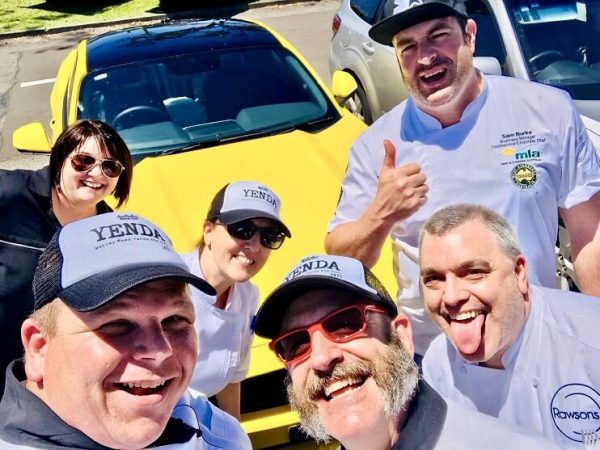
Paul and some of our favourite chefs who star in these pages. Venessa Barns, Adam Moore, Tawnya Bahr, Nick Whitehouse and Sam Burke. Funny that
110 staff? With almost no training? How did that work?
“My brother had a book “Cooking for a Hundred” as one of his TAFE books, and I begged him to send it up to me. In the meantime, the maitre’d felt sorry for me, so for a week he showed me how to cook for a hundred people until the book arrived. I used to sneak into the stores to steal product that was meant for the guests and served it to the staff. That made me very popular. The head chef was horrified, “The staff are eating better than the guests.”
I’d learnt to do desserts at the French restaurant, so one day I made a birthday cake that was shaped as a typewriter for the secretary, this showed up the Executive Chef of the island with his cream cake, he got the shits and banned me from the big kitchen. So I had to get up at 4am to make cakes in the main kitchen then go back to the staff kitchen 500 metres away and do breakfast for the staff.”
That was an experience! What next?
“I left Dunk, tripped around New Zealand, then went to work at Dairy Farmers in Sydney putting orders together for milkmen through the night! I was enrolled in electronic engineering at UTS, when I got a phone call from Yuri, who had just bought Julian’s Plum (then changed the name to The Plum) at Kirribilli, and asked me to be head chef, I thought why not?
Big responsibility and expectations. How did you handle that?
“I hired a really good second chef from a restaurant called Breheny’s near the Grape Escape, and for the next two years I learnt to cook. I was so lucky hiring great sous chefs to work with me and teach me, I guess I learnt backwards.
The Plum was a haven for all the top TV celebrities, it was so much fun. After 2 years I wanted to work in Canada in the Yukon, I had a job lined up as a chef, gave notice, and bought a motorbike to do a run around Australia first.
But Yuri didn’t want me to go, so he put an ad in the paper for an apprentice (he figured I needed an interest), but only sent me the female ones. I hired one, we soon went camping and I crashed my motorbike on the way home…long story short….that apprentice became my wife.”
Did you stay with Yuri?
“A fine dining offer at The Manor House came up, and I started as the vegetable chef. Leo Schofield wrote it up as BNO OTT (Big night out over the top). It was magical. We had to have six vegetables on the platter every day, it had grand pianos in the 3 dining rooms, everything was silver service, wait staff wore tuxedos, and there were 3 Rolls Royces and a stretch limo that would pick up guests, driving the customers to and from the restaurant. Within 3 months, they promoted me to dessert chef, and I did that for the next 2 years. I made between 10 and 12 desserts every service. I had an open brief, and within 6 months I convinced them to cut the laundry in half and build me a dessert section. 81% of customers ordered dessert.”
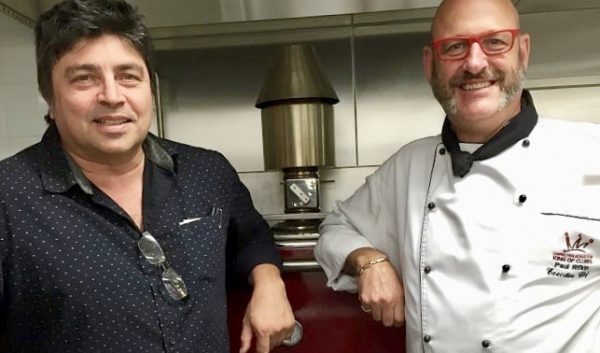
Geoff Jansz and Paul having chewed the fat…
This wonderful, top end service has some real lessons for us now, doesn’t it? Just how did it run?
“At The Manor House, the customers weren’t asked, ‘Would you like bread?’ Oh no, it was always, ‘Which bread would you like, garlic or herb?’ Every customer had a salad, “Which would you prefer today, a French or Caesar salad?” The waiters were trained like race horses, and they were making up to a thousand bucks a week in tips in the ‘80s. After being the dessert chef for 2 years, I asked for a pay rise, and was then made the sous chef, but I wasn’t allowed to tell the sous chef, when he found out he left. I did that for 5 years.”
Did you continue studying?
“At The Manor House I also started a psychology degree, did that part time, but had a house, mortgage, baby, so the restaurant career took over. The owner/chef was Jeffrey Aylemore, with Robert Manning. Tragically, Jeffrey died of cancer young, in his early 30’s. I was sous for 5 years, and I took over as executive chef after the executive chef resigned. (I bought a yacht, then a bigger one, then a bigger one again. I was living the high life as a chef.) I stayed for 3 years as executive chef.
Things started to happen for me, and I ended up on 2GB with John Raedler, with Raedler’s Recipes meeting long time friend Peter Howard.
I wanted to try hotels and started at the Glenview at St. Leonard’s, a very high-end boutique hotel, with only 60 rooms but it had an amazing F & B turnover, then I moved to the Country Comfort at Pennant Hills. Since 1990 I’d been involved in the Sydney Chefs’ Association, and by that time in 1994, I was President, being very involved in hosting chefs’ tables, and somehow managed to be involved in 21 of those for the next few years.”
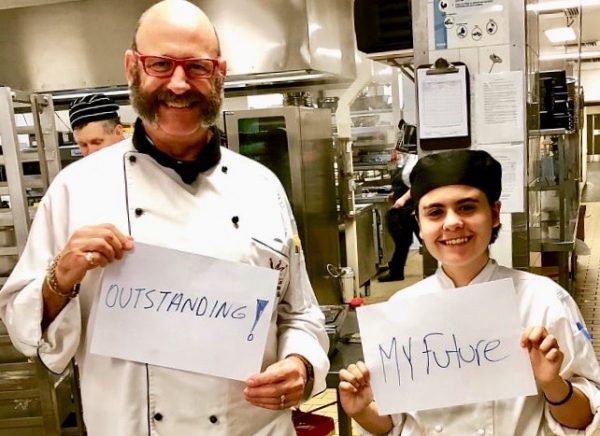
As Paul says, apprentices ARE our future
Your next challenge?
“Barnaby’s Restaurants became my next ‘home’ with modern Australian cuisine with two restaurants with about 15 chefs, I drove between both places , was I busy! We won the American Express Gold Plate Award three years in a row. (We won that each year at The Manor House as well), and the Glenview Inn won the best hotel for Flag Inns and Country Comfort also won awards.”
Why did you leave that for your own business?
“I needed a break so decided to do a dinner party business, which was huge in those days. I didn’t need to advertise, it was all word of mouth, and no menus! I would ask them to choose 6 ingredients that they liked, and I’d pick up the produce on the way there, flying by the seat of my pants, doing a 6 course degustation. It was fun.
Then the Sydney Olympics arrived and I was hired as a senior chef in the Athletes’ Village, where I was sous chef on the night shift for the athletes. We had to have food ready throughout the night, and breakfast shift on the way for the next shift in the morning. That was interesting. We saw heaps of funny stuff.”
From the Olympics to Ryde TAFE was a big change.
“I ended up at Ryde TAFE which was an eye opener. And from there I began at Campbelltown Catholic Club in 2001. Having come from fine dining, there was a lot of stuff about this market that I didn’t know, but the CEO took a punt on me, and I was there nearly 17 years. I effected lots of change, and I was given an open brief to make things better.
What did you pull from your experience there?
“At least 75% of your customers want simple, comfort food, and I learnt a lot about that very quickly. We built restaurants, opening one after the other: a hotel, convention centre, we changed the way things were done there. We took a golf club and changed that too. We went from doing $3 million dollars a year to $12 million dollars in food alone. I always had lots of apprentices, and one of my greatest joys was pushing the apprentices, moving them up, watching their joy of ‘getting through it’, competing at the Nestlé Golden Chef’s Hat, in fact all the competitions, that was a continuum.
Their success was my success, I certainly don’t take credit, but I loved being a part of it. Perhaps being a spark along the way was exciting, we had a bigger retention rate for staff than many places.”
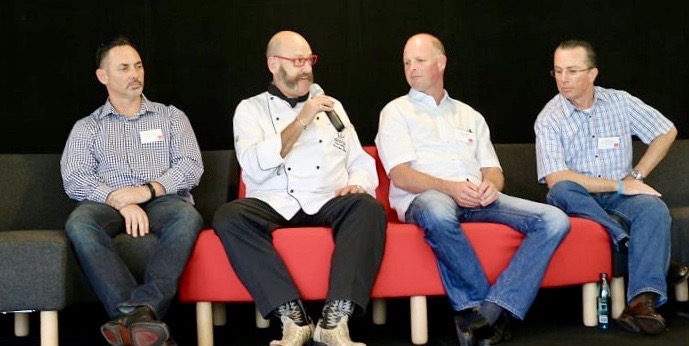
Paul and some great mates – including from L, Simon McNamara, Paul, John McFadden and Gary Johnson who’s in our list, holding court
Wow! Retention is a massive problem in the industry. What was your secret?
“There’s no secret, it’s all about developing people. I’m not there to churn out staff, it’s about being firm and fair. Not about beating them up, but building them up. Most of my head chefs had been my apprentices, other apprentices had come from establishments where they were badly treated.
I found the hard way you can’t always be right, sometimes you get it wrong. You’re looking for those bits and pieces that if developed well, then it will grow the person.
Most employers are looking in the wrong places and at the wrong things. It’s a lot simpler than what most people think it is. Box ticking won’t do it. I now want to mentor and support people to stay in the industry. The biggest problem in the culinary industry is people don’t know how to stay in it and move through a career coming out at the other end better for it.”
Yes, it really is, at the end of the day, about the people, isn’t it?
“People need help to know when to stay, when to go, how to manage up and down. If you find yourself at the top, then it’s vital you know how to instruct, how to lead.
And your advice to kids now, looking in?
“Advice? There’s always something that’s going to happen – that’s not right, every day, but you have to make sure that you know why you’re in it, and you have to know where you’re going with it. And if you’re ambitious, it’s never enough to learn how to cook, you have to learn leadership straight away. With leadership comes responsibility then comes higher positions and with higher pay.
There’s money in it, trust me, you just have to set the benchmark for yourself. Those who thrive look to learn, look to leadership. Once something negative happens to you don’t let it consume you, just get it fixed and move on.
You can sit around licking your wounds or just get over it and push on.”
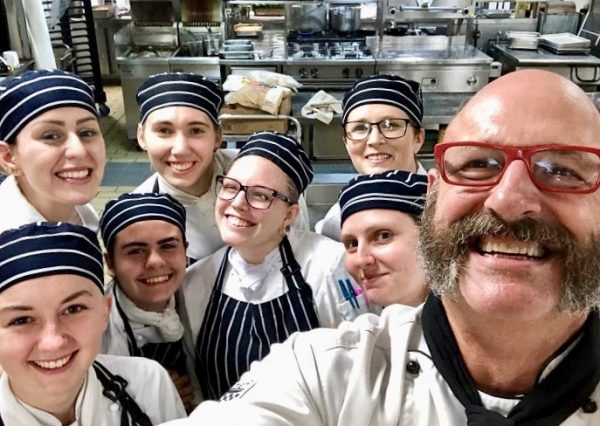
Paul with our stars, our future and notice something? It’s female chefs
So big sea and tree change, what’s next for Paul Rifkin?
“My passions now as always, are not just food. I love cars, travel, climbing, visiting small villages, eating their food, taking risks but living a big life. My life has been about personal challenges. I love to be scared. I’m scared to be scared, but I love the adrenalin, with an incredible trust in my ability to make it work.
Photography is also my passion. I’ve taken photos that people love and resonate with. I know I should be publishing photos and printing them. I keep releasing photos on social media and watch them take off. I like to make people happy with what I do – whether it’s food or photography. It’s not about the money, but that sure has given me a great life.
The majority of people have had their lives stolen from them – by lies, or thinking “I’m going to have a life later.” That’s what life isn’t about. It’s about living in the now. I took my young teenage son to Michelin restaurants around the world when he was 15, I sent my daughter when she was 17 to be an au pair in Nice, my other son went to the navy but is back to being a chef. Life experience.
I’ve always had a simple thing: that being a chef is being a performer. A happy customer is the applause. That’s as simple as it really is. People overcomplicate things. Most punts I’ve taken have paid off, people tell me. “You’re like a cat, you always land on your feet.”
Well, not all the time, but I believe that if you trip over, you bloody your nose and you bounce higher.”
And Paul Rifkin is about to bounce, somewhere, somehow, and it’ll be high. That’s for sure. Thank you Paul for letting us tell your story, share your lessons and wisdom, and what a life!
Check out his latest venture, where he shares the lessons:
Chef Paul Rifkin Consulting https://www.chefpaulrifkin.com.au (+61)0403 319 638
Chrissie ☺



